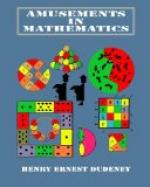395.—A WAR PUZZLE GAME.
[Illustration]
Here is another puzzle game. One player, representing the British general, places a counter at B, and the other player, representing the enemy, places his counter at E. The Britisher makes the first advance along one of the roads to the next town, then the enemy moves to one of his nearest towns, and so on in turns, until the British general gets into the same town as the enemy and captures him. Although each must always move along a road to the next town only, and the second player may do his utmost to avoid capture, the British general (as we should suppose, from the analogy of real life) must infallibly win. But how? That is the question.
396.—A MATCH MYSTERY.
Here is a little game that is childishly simple in its conditions. But it is well worth investigation.
Mr. Stubbs pulled a small table between himself and his friend, Mr. Wilson, and took a box of matches, from which he counted out thirty.
“Here are thirty matches,” he said. “I divide them into three unequal heaps. Let me see. We have 14, 11, and 5, as it happens. Now, the two players draw alternately any number from any one heap, and he who draws the last match loses the game. That’s all! I will play with you, Wilson. I have formed the heaps, so you have the first draw.”
“As I can draw any number,” Mr. Wilson said, “suppose I exhibit my usual moderation and take all the 14 heap.”
“That is the worst you could do, for it loses right away. I take 6 from the 11, leaving two equal heaps of 5, and to leave two equal heaps is a certain win (with the single exception of 1, 1), because whatever you do in one heap I can repeat in the other. If you leave 4 in one heap, I leave 4 in the other. If you then leave 2 in one heap, I leave 2 in the other. If you leave only 1 in one heap, then I take all the other heap. If you take all one heap, I take all but one in the other. No, you must never leave two heaps, unless they are equal heaps and more than 1, 1. Let’s begin again.”
“Very well, then,” said Mr. Wilson. “I will take 6 from the 14, and leave you 8, 11, 5.”
Mr. Stubbs then left 8, 11, 3; Mr. Wilson, 8, 5, 3; Mr. Stubbs, 6, 5, 3; Mr. Wilson,4, 5, 3; Mr. Stubbs, 4, 5, 1; Mr. Wilson, 4, 3, 1; Mr. Stubbs, 2, 3, 1; Mr. Wilson, 2, 1, 1; which Mr. Stubbs reduced to 1, 1, 1.
“It is now quite clear that I must win,” said Mr. Stubbs, because you must take 1, and then I take 1, leaving you the last match. You never had a chance. There are just thirteen different ways in which the matches may be grouped at the start for a certain win. In fact, the groups selected, 14, 11, 5, are a certain win, because for whatever your opponent may play there is another winning group you can secure, and so on and on down to the last match.”
397.—THE MONTENEGRIN DICE GAME.




